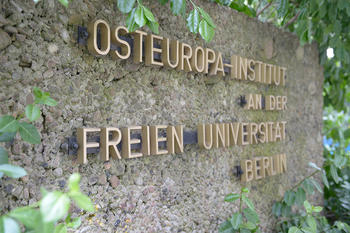Freie Universität Berlin and Moscow Higher School of Economics Increase Their Cooperation in Internationalizing Higher Education
More Exchange Opportunities for Students, Researchers, and Staff
Oct 01, 2015
Researchers from the Institute for East European Studies at Freie Universität are involved in the project.
Image Credit: Bernd Wannenmacher
Freie Universität Berlin and the Higher School of Economics in Moscow (HSE) are increasing their cooperation in research and teaching. The president of Freie Universität Professor Peter-André Alt, and the rector of HSE, Yaroslav Kuzminov, signed an agreement of cooperation that will facilitate opportunities for students, doctoral candidates, researchers, and staff to study, do research, or work at the partner university.
In 2013 the cooperation began with a bilateral agreement between the institutes of sociology of the two universities. Now all of the institutes and departments of Freie Universität and HSE are participating in the exchange. HSE is consistently ranked as one of Russia’s top universities, and is a leader in Russian education and one of the preeminent universities for economics and social sciences in Eastern Europe and Eurasia. Freie Universität is one of eleven universities in Germany awarded Excellence status in the Germany-wide competition to promote top research at German universities.
The president of Freie Universität, Professor Peter André Alt, said about the agreement, “Working out closer forms of cooperation with the Higher School of Economics in Moscow is an important strategic component of the international networking policy of Freie Universität Berlin. Particularly students and junior researchers will benefit greatly from the new cooperation agreement between the two institutions.”
The rector of HSE, Yaroslav Kuzminov, said, "We see mutual interest in cooperation both on the part of researchers and students. We have similar values, and our universities are both relatively young and innovative, so it was easy for our staff to find common language. The newly signed agreement opens a way for more students and doctoral students to get international study experiences, compare different teaching strategies, and widen their horizons. German-Russian exchange is particularly good in this respect. Berlin and Moscow are congenial, and we are always comfortable working with our German colleagues.”
Alexander Chepurenko, the director of the Institute of Sociology at HSE, said, “We started our cooperation two years ago aiming to establish a platform for intensive contacts between younger researchers and renowned specialists in sociology and related fields. A network of talented specialists interested in joint research of modern societies in East and West has been shaped to date.”
Professor Katharina Bluhm, a sociologist at the Institute for East European Studies of Freie Universität, adds, “There has been strong interest in spending a semester at the Higher School of Economics on the part of the German students during these past years. We have also done research projects, a number of conferences for PhD students, and a summer school for master’s students together. Now the cooperation is going to be further intensified, especially on the doctoral level.”
For both Freie Universität and HSE, internationalization of research and teaching is part of the university's main goals. For international researchers, doctoral students, and students, Freie Universität is the most popular location in Germany. Freie Universität has seven international liaison offices, and one of them is in Moscow. During the past two decades, HSE has distinguished itself with extraordinary internationalization strategies and cooperation. Research centers at HSE are led by renowned scientists such as the Nobel Prize winner in economics, Eric Maskin; the political scientist Ronald Inglehart; and the mathematician and winner of the Fields Medal, a particularly high honor for mathematicians, Andrey Okunkov.

